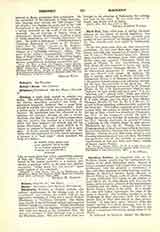

Black Fast, the.—This form of fasting, the most rigorous in the history of church legislation, was marked by austerity regarding the quantity and quality of food permitted on fasting days as well as the time wherein such food might be legitimately taken.
In the first place more than one meal was strictly prohibited. At this meal flesh meat, eggs, butter, cheese, and milk were interdicted (Gregory I, Decretals IV, cap. vi; Trullan Synod, Canon lvi). Besides these restrictions abstinence from wine, especially during Lent, was enjoined (Thomassin, Traite des jeans de l’Eglise, II, vii). Furthermore, during Holy Week the fare consisted of bread, salt, herbs, and water (Laymann, Theologia Moralis, Tr. VIII; De observatione jejuniorum, i). Finally, this meal was not allowed until sunset. St. Ambrose (De Ella et jejunio, sermo viii, in Psalm CXVIII), St. Chrysostom (Homil. iv in Genesim), St. Basil (Oratio i, De jejunio) furnish unequivocal testimony concerning the three characteristics of the black fast. The keynote of their teaching is sounded by St. Bernard (Sermo. iii, No. 1, De Quadragesima), when he says “hitherto we have fasted only until none” (3 p. m.) “whereas, now” (during Lent) “kings and princes, clergy and laity, rich and poor will fast until evening”. It is quite certain that the days of Lent (Muller, Theologia Moralis, II, Lib. II, Tr. ii, § 165, no. 11) as well as those preceding ordination were marked by the black fast. This regime continued until the tenth century when the custom of taking the only meal of the day at three o’clock was introduced (Thomassin, loc. cit.). In the fourteenth century the hour of taking this meal was changed to noon-day (Muller, loc. cit.). Shortly afterwards the practice of taking a collation in the evening began to gain ground (Thomassin, op. cit., II, xi). Finally, the custom of taking a crust of bread and some coffee in the morning was introduced in the early part of the nineteenth century. During the past fifty years, owing to ever changing circumstances of time and place, the Church has gradually relaxed the severity of penitential requirements, so that now little more than a vestige of former rigour obtains.
J. D. O’NEILL.

